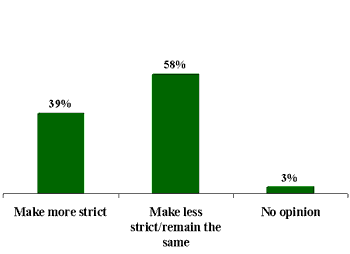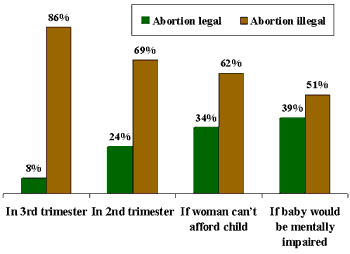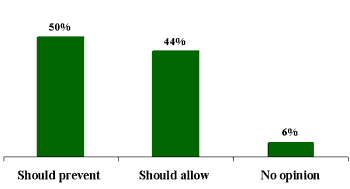GALLUP NEWS SERVICE
PRINCETON, NJ -- Abortion policy debates are popping up in several venues. In the U.S. Senate, a Bush judicial appointee faces scrutiny over her abortion record. In the U.S. House of Representatives, legislation is pending to outlaw the so-called "partial birth abortion" procedure. And at the United Nations, the United States has recently withheld funding for population control programs.
The issues are generating the customary political sparks in Washington, with the usual coalitions of "pro-life" and "pro-choice" groups stoking the debate. But Gallup data suggests that public reaction to the issues at hand, and to the abortion controversy more generally, is far more subtle and subdued.
Gallup's long history of polling on abortion finds some evidence
that Americans are sympathetic to the pro-choice side, with the
majority (58%) saying abortion laws should remain as they are or be
loosened, rather than tightened.
| Preference for U.S. Abortion Laws |
 |
| Jan 7-9, 2002 |
At the same time, a majority of Americans want to see restrictions on abortion, particularly abortions conducted after the first trimester, and those conducted for matters of lifestyle or convenience. Indeed, when asked about specific anti-abortion oriented regulations, Americans favor a number of policies that, if enacted, would make abortion far less accessible than it is today.
| Abortion Restrictions Favored by Majority of Americans |
 |
| Mar 30 – Apr 2, 2000 |
Despite these views, however, the public does not seem highly motivated to enact these changes to abortion laws. While the majority of Americans say they feel strongly about their views on abortion, few indicate that their support for political candidates depends on agreement over abortion, or that they are anxious for candidates to discuss it. For instance, in January 2000, abortion was one of only four issues, out of 25 measured by Gallup, that less than a majority of Americans rated as highly important to them in voting for president. Just 47% said abortion policy was extremely or very important to them in making their choice for president. This is compared to 86% who rated education policy (the most highly rated issue) as this important.
In terms of the specific abortion issues making the news this week, the available poll data suggests that the attitudes of the public are generally similar to those of the Bush administration.
U.S. District Court Nominee, Justice Priscilla Owen
Yesterday, the Senate Judiciary Committee held confirmation hearings on Texas Supreme Court Associate Justice Priscilla Owen, President Bush's nominee for the Fifth Circuit Court of Appeals. Owen's confirmation is viewed as an important test of whether Bush can get his nominees through the Democrat-controlled Senate, or whether they will all go the way of the recently defeated Judge Charles Pickering.
Although Owen's opponents have criticized her rulings on a variety of issues and raised questions about her past ties with the Enron Corporation, the "primary bone of contention," over her nomination, as one report calls it, is her record on the issue of parental notification for minor girls trying to obtain an abortion. According to the National Women's Law Center, a group that opposes Owen's nomination, "almost all of the opinions Justice Owen has authored or joined that address reproductive choice directly have been in the context of the Texas parental notification law, which requires pregnant minors who wish to obtain an abortion without notifying either of their parents to petition the court for a judicial bypass." They find fault with Owen for denying the petitioners a bypass in most of these cases, thus denying them access to abortion without notifying at least one parent.
The specific aspects of these cases could conceivably include decisions by Owen that the public disagrees with but, in general, polling shows wide public support for parental consent laws -- policies that are even more restrictive than parental notification to a minor girl's freedom to have an abortion.
* A poll conducted in 2000 by the Los Angeles Times found more than four in five Americans (82%) saying parental consent should be required when asked "Do you think girls under the age of 18 should or should not be required to obtain the consent of at least one of their parents before having an abortion?"
* Similarly, a Gallup survey in 1996 found 74% in favor of parental consent for minors.
Informed Consent
Another aspect of Owen's legislative record that pro-choice groups criticize is her interpretation of informed consent policies, which require that minor girls must be informed of the risks and alternatives to abortion. Her critics, including Senator Edward Kennedy in yesterday's committee hearing, say she goes beyond legislative intent in requiring extensive counseling and education to young women on these matters.
Public polls do not address the specific criticisms of Owen's interpretation of Texas informed consent laws, but in general, the American public widely supports such requirements. Gallup's 1996 survey on abortion regulations found 86% of Americans in favor of laws "requiring doctors to inform patients about alternatives to abortion before performing the procedure." Only 11% were opposed.
New "Partial Birth Abortion" Legislation
On a 20-8 vote, the House Judiciary Committee recently passed a bill (supported by President Bush) that prohibits what is commonly called partial-birth abortions. The bill is likely to pass in the full House but faces an uncertain future in the Senate.
The issue of partial birth abortion has been measured by a number of poll organizations over the past five years. While the wordings differ widely, most questions on this subject make reference to the term "partial birth abortion," often elaborating that it is a "late term" procedure or that it is conducted in the last six months of pregnancy.
Gallup's standard wording reads: "Would you vote for or against a law which would make it illegal to perform a specific abortion procedure conducted in the last six months of pregnancy known as a 'partial birth abortion,' except in cases necessary to save the life of the mother?" When last asked, in October 2000, 63% of Americans told Gallup they would vote for such a law; just 35% were opposed.
A review of all major public polling on this subject actually finds wide variation in support for partial birth abortion bans, ranging from 77% in one poll that emphasized the "late term" nature of the procedure, down to 49% in another.
A recent Gallup poll found majority opposition to banning the procedure when phrasing the question this way: "Would you favor or oppose a law making it illegal for doctors to conduct a late term abortion procedure known as partial-birth abortion?" When not providing respondents with specific legislative details about the timing of the procedure or the life of the mother exception, and indicating that a doctor is involved, the survey question yields net opposition to the ban: only 43% favor banning the procedure while 51% are opposed.
Apart from this most recent Gallup survey, a review of the questions asked by different polling organizations suggests that, while Americans may be somewhat unfamiliar with the specific aspects of the procedure and can thus be swayed by question wording, they are generally supportive of banning the procedure when told it is a late term procedure -- and particularly when told that the ban would make an exception in cases where the life of the mother is at stake.
U.S. Support for U.N. Family Planning Programs
The Bush administration recently announced that the United States will withhold money previously earmarked for the United Nation's Population Fund, charging that some of the money aimed at family planning goes to support coercive abortion related activities in China. That announcement has drawn fire from U.N. officials, the Chinese, and domestic family planning advocates in Congress and elsewhere.
The available polling on this topic suggests no clear cut majority either in support of or opposed to the Bush administration position on this issue. The last time U.S. funding of U.N. population control efforts was an issue, in 1999, Gallup found half of Americans in favor of withholding funding; while 44% were opposed.
| As you may know, countries that belong to the United Nations are required to pay annual dues to remain a part of the UN. In terms of international organizations which perform abortions or promote abortion rights in other countries, do you think--the United States should allow some of its UN dues to go to these organizations, or do you think the US should prevent any of its dues money from going to these organizations? |
 |
| Nov 18-21, 1999 |
Survey Methods
These results are based on telephone interviews with a randomly selected national sample of 1,012 adults, 18 years and older, conducted May 6-9, 2002. For results based on this sample, one can say with 95 percent confidence that the maximum error attributable to sampling and other random effects is plus or minus 3 percentage points. In addition to sampling error, question wording and practical difficulties in conducting surveys can introduce error or bias into the findings of public opinion polls.
Do you think abortions should be legal under any circumstances, legal only under certain circumstances, or illegal in all circumstances?
|
Legal under any circumstances |
Legal only under certain circumstances |
Illegal in all circumstances |
No opinion |
|
|
% |
% |
% |
% |
|
|
2002 May 6-9 |
25 |
51 |
22 |
2 |
|
2002 Mar 22-24 |
27 |
53 |
19 |
1 |
|
2002 Feb 8-10 |
26 |
54 |
18 |
2 |
|
2001 Aug 10-12 |
26 |
56 |
17 |
1 |
|
2001 May 10-14 |
26 |
58 |
15 |
1 |
|
2001 Mar 26-28 |
26 |
51 |
18 |
5 |
|
2000 Mar 30-Apr 2 |
28 |
51 |
19 |
2 |
|
2000 Jan 13-16 |
26 |
56 |
15 |
3 |
|
1999 Apr 30-May 2 |
27 |
55 |
16 |
2 |
|
1998 Jan 16-18 |
23 |
59 |
17 |
1 |
|
1997 Nov 6-9 |
26 |
55 |
17 |
2 |
|
1997 Aug 12-13 |
22 |
61 |
15 |
2 |
|
1996 Sep 20-22 |
24 |
52 |
17 |
7 |
|
1996 Jul 25-28 |
25 |
58 |
15 |
2 |
|
1995 Sep 22-24 |
31 |
54 |
12 |
3 |
|
1995 Feb 24-26 |
33 |
50 |
15 |
2 |
|
1994 Sep 6-7 |
33 |
52 |
13 |
2 |
|
1994 Mar 28-30 |
31 |
51 |
15 |
3 |
|
1993 Mar 12-14 |
32 |
51 |
13 |
4 |
|
1992 Jul 23-24 ^ |
34 |
48 |
15 |
3 |
|
1992 Jun 29 |
34 |
48 |
13 |
5 |
|
1992 Jan 16-19 |
31 |
53 |
14 |
2 |
|
1991 Sep 5-8 |
33 |
49 |
14 |
4 |
|
1991 May 30-Jun 2 |
32 |
50 |
17 |
1 |
|
1990 Apr 5-20 |
31 |
53 |
12 |
4 |
|
1989 Jul 6-9 |
29 |
51 |
17 |
3 |
|
1989 Jul 6-7 ^ |
29 |
51 |
17 |
3 |
|
1989 Apr 12-13 ^ |
27 |
50 |
18 |
5 |
|
1988 Sep 25-Oct 1 |
24 |
57 |
17 |
2 |
|
1985 Jan 3-4 ^ |
21 |
55 |
21 |
3 |
|
1983 Jun 24-27 |
23 |
58 |
16 |
3 |
|
1981 May 8-11 |
23 |
52 |
21 |
4 |
|
1980 Jul 11-14 |
25 |
53 |
18 |
4 |
|
1979 Feb 23-26 |
22 |
54 |
19 |
5 |
|
1977 Dec 9-12 |
22 |
55 |
19 |
4 |
|
1975 Apr 4-7 |
21 |
54 |
22 |
3 |
|
^ Gallup/Newsweek |
(If certain circumstances)Do you think abortion should be legal in most circumstances or only in a few circumstances?
Q.36/Q.37 COMBINED RESPONSES
|
Legal under any circumstances |
Legal under most circumstances |
Legal only in a few circumstances |
Illegal in all circumstances |
No opinion |
|
|
% |
% |
% |
% |
% |
|
|
2002 May 6-9 |
25 |
12 |
39 |
22 |
2 |
|
2002 Mar 22-24 |
27 |
12 |
40 |
19 |
2 |
|
2001 Aug 10-12 |
26 |
12 |
43 |
17 |
2 |
|
2001 May 10-14 |
26 |
15 |
41 |
15 |
3 |
|
2001 Mar 26-28 |
26 |
13 |
38 |
18 |
5 |
|
2000 Mar 30-Apr 2 |
28 |
11 |
38 |
19 |
4 |
|
2000 Jan 13-16 |
26 |
17 |
39 |
15 |
3 |
|
1999 Apr 30-May 2 |
27 |
12 |
42 |
16 |
3 |
|
1998 Jan 16-18 |
23 |
16 |
42 |
17 |
2 |
|
1997 Nov 6-9 |
26 |
15 |
40 |
17 |
2 |
|
1997 Aug 12-13 |
22 |
12 |
48 |
15 |
3 |
|
1996 Jul 25-28 |
25 |
13 |
43 |
15 |
4 |
|
1995 Sep 22-24 |
31 |
14 |
39 |
12 |
4 |
|
1995 Feb 24-26 |
32 |
9 |
41 |
15 |
3 |
|
1994 Sep 6-7 |
33 |
13 |
38 |
13 |
3 |
With respect to the abortion issue, would you consider yourself to be pro-choice or pro-life?
|
Pro-choice |
Pro-life |
MIXED/ NEITHER (vol.) |
DON'T KNOW WHAT TERMS MEAN (vol.) |
No opinion |
|
|
% |
% |
% |
% |
% |
|
|
2002 May 6-9 |
47 |
46 |
3 |
3 |
1 |
|
2001 Aug 10-12 |
46 |
46 |
3 |
3 |
2 |
|
2001 May 10-14 |
48 |
42 |
4 |
4 |
2 |
|
2001 Mar 26-28 |
47 |
41 |
4 |
6 |
2 |
|
2000 Mar 30-Apr 2 |
48 |
43 |
2 |
4 |
3 |
|
1999 Apr 30-May 2 |
48 |
42 |
3 |
4 |
3 |
|
1998 Jan 16-18 |
48 |
45 |
3 |
2 |
2 |
|
1997 Nov 6-9 |
51 |
40 |
3 |
3 |
3 |
|
1997 Aug 12-13 |
47 |
44 |
3 |
3 |
3 |
|
1996 Jul 25-28 |
53 |
36 |
5 |
3 |
3 |
|
1995 Sep 22-24 |
56 |
33 |
5 |
3 |
3 |
|
NOTE: Trends taken only from polls where previous two questions (abortion legal under which circumstances) also asked. |
|||||
Now we have a question about the landmark Supreme Court decision on abortion known as Roe versus Wade. From what you know or have heard about Roe versus Wade, do you think the Supreme Court decision -- [ROTATED: goes too far in making abortion legal, is about right, or does not go far enough in making abortion legal] -- or are you unsure?
|
Too far |
About right |
Not far enough |
Unsure |
No answer |
|
|
2002 May 6-9 |
31% |
34 |
11 |
23 |
1 |
Next, I'm going to read you a list of issues. Regardless of whether or not you think it should be legal, for each one, please tell me whether you personally believe that in general it is morally acceptable or morally wrong. How about … [RANDOM ORDER]?
A. Abortion
|
Morally acceptable |
Morally wrong |
DEPENDS ON SITUATION (vol.) |
NOT A MORAL ISSUE (vol.) |
No opinion |
|
|
2002 May 6-9 |
38% |
53 |
8 |
* |
1 |
|
2001 May 10-14 |
42% |
45 |
11 |
1 |
1 |
